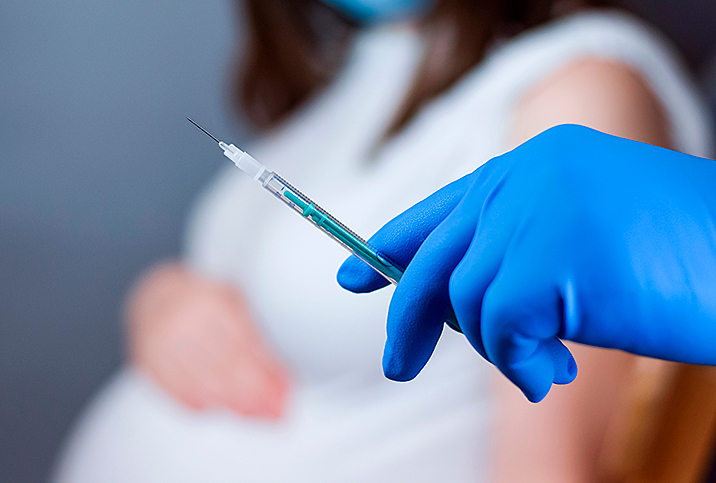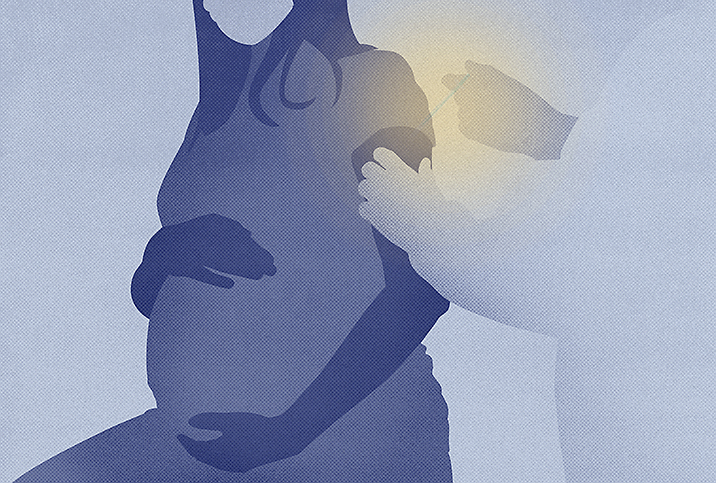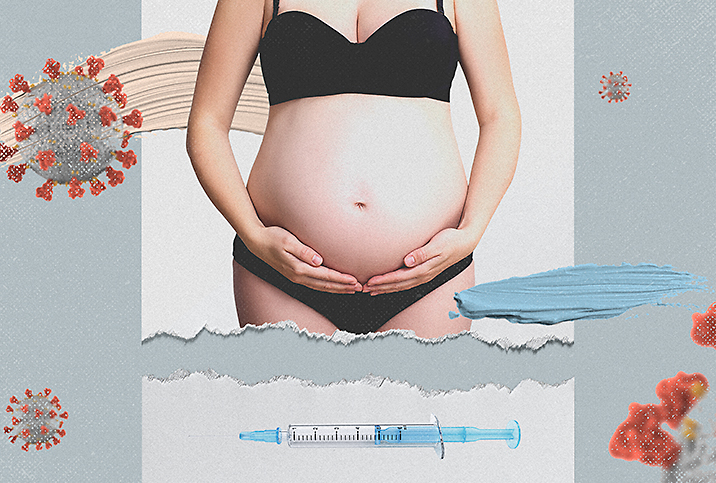A New COVID-19 Antiviral Pill Might Not Be Safe to Take While Pregnant

As the COVID-19 battle continues to wage, two major drug manufacturers recently added a couple more weapons to the treatment armory. Oral antiviral medications PAXLOVID by Pfizer and molnupiravir by Merck/MSD and Ridgeback Biotherapeutics gained Emergency Use Authorization (EUA) from the Food and Drug Administration (FDA) in late 2021.
Neither pill has received full FDA approval yet. Both are intended to reduce COVID symptoms and the risk of hospitalization and death in high-risk patients. They're prescribed by a physician and taken for five days, as quickly as possible after a positive test. Other authorized treatments—namely, the antiviral remdesivir and monoclonal antibodies—are both delivered intravenously.
Molnupiravir's EUA came with strong caveats. The therapy is "limited to situations where other FDA-authorized treatments for COVID-19 are inaccessible or are not clinically appropriate" in patients who are at high risk of hospitalization or death, according to a statement issued by the FDA in December 2021.
Also significant: Neither the FDA nor Merck is recommending molnupiravir for use during pregnancy, except in extreme situations where other treatment options aren't available.
Under an EUA, drugs that have not yet been formally approved by the FDA can be authorized for use in a public health emergency. It typically takes a drug more than a decade to obtain full FDA approval, as it's required to undergo multiple rounds of clinical testing to prove it's safe and effective. These trials also give researchers important data about a drug's contraindications, dosing requirements and side effects.
"It always takes a long time to do these kinds of studies," said Myra Wick, M.D., a board-certified OB-GYN and medical geneticist at the Mayo Clinic. "But we're seeing things happen more quickly right now with COVID."
Neither the FDA nor Merck is recommending molnupiravir for use during pregnancy, except in extreme situations where other treatment options aren't available.
Molnupiravir was tested on both rats and nonpregnant humans. The FDA and Merck recommendations against use during pregnancy were forged from findings from the animal trial.
"The data we have now on molnupiravir [related to pregnancy] is from exposure in rats, which showed some fairly serious birth defects when given eight times the equivalent dosage for humans, per body weight," said Arizona-based OB-GYN Greg Marchand, M.D., F.A.C.S., F.A.C.O.G. "The birth defects included problems in bones, eyes, and kidneys, as well an increased rate of miscarriage. While rats are different animals than humans, this is certainly more concerning than if no birth defects were seen."
The drug is also not recommended for women who are lactating, as it's not yet known if the medication crosses into breast milk. Similarly, it's unknown how it could affect sperm cells. Men taking molnupiravir are advised to use reliable birth control during the duration of the five-day treatment—and for at least three months afterward—if they're sexually active with a partner who could become pregnant. Women should also use birth control while taking the drug and for several days after they've finished the treatment.
Merck/MSD has established a "pregnancy surveillance program" to monitor pregnancy outcomes in people who've been exposed to the drug while pregnant. Patients are encouraged to self-report through the company's website.
Molnupiravir is also not authorized for use in patients under the age of 18. "Under 18, bones are still developing," Wick said, "and so the thought is that it could potentially impact bone development."
'If the drug induces mutations in the DNA, it may contribute to cancer development, birth defects or abnormal spermatogenesis.'
But, Wick added, that's not yet known for certain: "We don't know that yet. We don't have that data in humans. But because of what they saw in rat models, they were concerned about bones in young people, as well."
Molnupiravir works by encouraging SARS-CoV-2 to replicate and then sneaking errors into the virus' RNA. Eventually, these flawed copies cause the virus to stop reproducing. But during the clinical trials on rats, mutations were also found in the rat embryos.
"There is concern that the drug has the potential to cause mutations in human DNA," noted Kecia Gaither, M.D., M.P.H., F.A.C.O.G., director of perinatal services at NYC Health + Hospitals/Lincoln. "This is a concern both for women, pregnant or not, and men. If the drug induces mutations in the DNA, it may contribute to cancer development, birth defects or abnormal spermatogenesis."
Other treatments exist that are safe for pregnant or lactating women who get COVID-19. Wick said one-time infusions of monoclonal antibodies are typically the first-line treatment for pregnant patients at the Mayo Clinic. While she doesn't know of any Mayo OB patients who've been prescribed PAXLOVID yet, that antiviral didn't show embryo toxicity and could be prescribed.
Until there's more definitive data demonstrating the drug is safe for their patients, Wick and Gaither said it's unlikely they'll prescribe molnupiravir.
"We have other things that we could use first," Wick said. "We may not have full safety data, but we haven't seen anything concerning in the monoclonal antibodies or the PAXLOVID."
"At this juncture, there doesn't exist any short- or long-term data on human outcomes," Gaither added. "Given such, I would elect to proceed with caution."


















